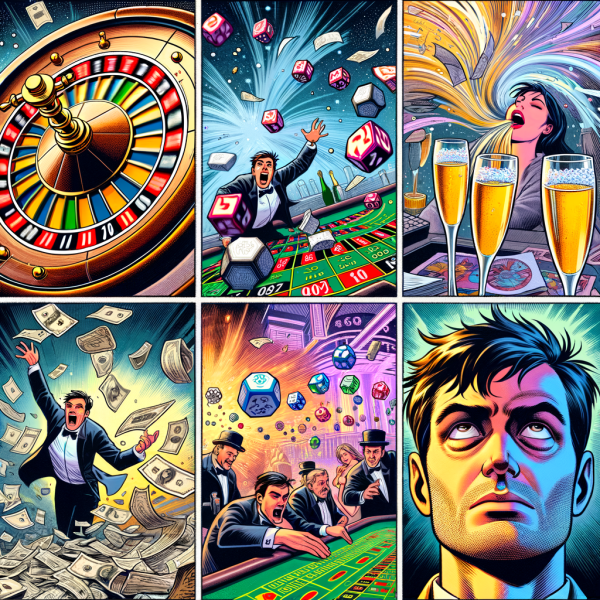The Allure of High-Stakes Gambling: A Double-Edged Sword
High-stakes gambling has a magnetic pull that attracts both seasoned gamblers and curious novices. The bright lights of casinos, the thrill of spinning roulette wheels, and the cheers of winners create an electrifying atmosphere that can cloud judgment. It promises not just monetary rewards but also a sense of adventure and excitement. However, the same allure that draws people in can lead to devastating consequences, especially when mixed with substances such as alcohol.
In the case of our protagonist—the drunk gambler who won and lost $1 million in a single night—high-stakes gambling presented not just an opportunity for financial windfall, but also an intoxicating blend of risk and reward. The euphoric highs of winning can be intoxicating, leading many to believe they are invincible, capable of continuous success. Yet, this belief often blinds individuals to the inherent risks involved, paving the way for destructive behaviors.
The sense of community among gamblers also plays a critical role. The narratives of winners often overshadow the grim realities faced by losers. Stories of life-changing wins circulate, encouraging people to take risks they might otherwise avoid. In a high-stakes environment, it is easy to get swept away by the promise of instant wealth, sometimes leading to catastrophic financial decisions.
This duality—the thrill of victory versus the agony of defeat—creates a complex relationship with gambling. For some, it’s merely a form of entertainment, while for others, it transforms into an obsession that prioritizes immediate gratification over long-term consequences. The fine line between control and chaos is often crossed with alarming ease in the world of high-stakes gambling.
Analyzing the Psychology Behind Risky Betting Behavior
Understanding the psychology behind risky betting behavior requires a deep dive into cognitive biases and emotional triggers. For many, gambling is not merely a game of chance but a calculated risk where emotions dominate decision-making processes. The gambler’s fallacy—the belief that past events influence future outcomes—can lead individuals to make irrational bets, fueled by the desire to recoup losses or chase the high of a previous win.
Alcohol consumption exacerbates these biases, further impairing judgment and amplifying emotions. When our drunk gambler entered that casino, he was not just wagering money; he was gambling with his perception of reality. Intoxication can lead to overconfidence, where individuals believe they possess a “lucky charm” or an innate ability to predict outcomes. This overconfidence can result in betting behaviors that defy logical reasoning.
Moreover, the social environment of gambling establishments can reinforce risky behaviors. The cheering crowds and celebratory atmosphere create a sense of camaraderie that diminishes personal accountability. People are more likely to take risks when they observe others winning, and this social proof can be compelling, pushing individuals to make hasty decisions without fully considering the potential repercussions.
Understanding these psychological factors highlights the importance of responsible gambling. Establishing limits, recognizing emotional triggers, and being aware of cognitive biases is essential for mitigating the risks associated with high-stakes gambling. Our drunk gambler’s experience serves as a cautionary tale of how easily one can fall victim to their own psychological pitfalls.
The Night of Reckoning: How Luck Can Shift Instantly
The night of reckoning for our gambler unfolded in a whirlwind of excitement. After a few rounds of drinks, he found himself seated at a high-stakes table, the weight of the chips in front of him blurring the lines of reality. With each bet, the stakes climbed higher, and so did his confidence. Luck appeared to be on his side; he made a series of successful bets that resulted in an astonishing $1 million win. The thrill was palpable, and for a moment, everything felt right.
However, the nature of gambling is inherently volatile. The very luck that had propelled him to unimaginable heights began to wane as quickly as it had come. Fueled by euphoria and intoxication, he continued to bet without hesitation, convinced that fortune would continue to favor him. The reality, however, was that luck can shift in an instant, and before long, the tide turned against him.
In mere hours, the initial euphoria transformed into despair. The gambler lost not only the $1 million he had won but also his initial stake, plunging deeper into financial chaos. This dramatic shift serves as a powerful reminder that gambling is a rollercoaster of chance, and the thrill of winning can quickly morph into the pain of loss.
The lesson here is clear: luck is fickle, and the distinction between winning and losing can be razor-thin. The gambler’s story emphasizes the importance of understanding the risks associated with gambling and the need for self-restraint, particularly when alcohol is involved. It underscores the reality that what goes up can just as easily come down, and the emotional toll of such losses can be significant.
Consequences of Excess: The Aftermath of a Million-Dollar Win
The aftermath of the million-dollar win was nothing short of catastrophic for our gambler. Initially, he celebrated with friends, basking in the glory of his unexpected fortune. Yet, as the alcohol wore off and the sun rose the next day, the harsh reality of his situation began to set in. He had not only lost his winnings but had also damaged relationships, invoked feelings of shame, and faced the prospect of financial ruin.
Financially, the consequences were staggering. Losing a million dollars in one night does not only impact immediate finances but can also lead to long-term debt and credit issues. The gambler found himself grappling with decisions that would affect his financial future, including potential bankruptcy. Such outcomes are not uncommon for individuals caught in the whirlwind of high-stakes gambling, especially when combined with the impaired judgment that alcohol brings.
Emotionally and psychologically, the aftermath proved to be equally harrowing. The euphoric high of winning followed by a devastating loss often leads to feelings of depression, guilt, and anxiety. The gambler’s identity became intertwined with his gambling success, and the loss challenged not only his financial standing but also his self-worth. Compounding the issue, he may also face judgment from friends and family, further isolating him during a vulnerable time.
Ultimately, the aftermath of a million-dollar win serves as a stark reminder of the consequences of excess in gambling. It highlights the need for financial literacy and emotional awareness, emphasizing the importance of responsible gambling practices and the need for support systems for those at risk.
The Fine Line Between Entertainment and Addiction in Gambling
Gambling can be an entertaining pastime, but it also carries the risk of addiction, creating a fine line that is often difficult to navigate. For many, gambling begins as a form of entertainment—an enjoyable night out with friends or an exciting way to test luck. However, this innocent engagement can rapidly spiral into compulsive behavior, leading to devastating consequences.
Understanding this fine line is essential for maintaining a healthy relationship with gambling. The thrill of winning can trigger the brain’s reward system, releasing dopamine and reinforcing the desire to continue betting. This cycle can lead to a dependency on gambling for emotional satisfaction, where individuals may find themselves returning to the tables in search of the same high, even at their own detriment.
Our drunk gambler’s experience serves as a prime example of how quickly entertainment can morph into addiction. What started as a celebratory night transformed into a regrettable decision-making spiral, exacerbated by alcohol consumption. The initial excitement gave way to compulsive betting, showcasing the dangers of engaging in gambling without proper awareness of its potential for addiction.
Recognizing the signs of gambling addiction is crucial. Individuals should remain vigilant about their motivations for gambling and the emotional states that accompany it. Responsible gambling practices, such as setting limits, self-exclusion, and seeking help when needed, can help individuals maintain a healthy balance between entertainment and potential addiction.
Lessons Learned: What This Story Teaches About Gambling Ethics
The story of the drunk gambler who won and lost $1 million in one night offers profound lessons about gambling ethics. First and foremost, it serves as a reminder of the importance of responsible behavior in gambling. Ethical gambling practices involve recognizing the inherent risks, exercising self-control, and understanding the psychological factors at play.
Moreover, this narrative underscores the significance of transparency and honesty within the gambling industry. Casinos and betting establishments have a responsibility to promote responsible gambling and provide resources for those who may be struggling. Incorporating educational programs and support systems can create a safer gambling environment for everyone involved.
Additionally, this story prompts a critical examination of societal attitudes toward gambling. The romanticization of high-stakes gambling may contribute to a culture that glorifies risk-taking without acknowledging the potential consequences. By fostering open discussions about the risks and ethics associated with gambling, we can create a more informed and responsible gambling community.
Ultimately, the lessons learned from this gambler’s experience emphasize the need for ethical considerations in gambling practices. By prioritizing responsibility, transparency, and education, we can work towards a healthier approach to gambling that protects individuals and promotes a culture of accountability.
Q&A Section
Q: What happened to the gambler after losing the $1 million?
A: The gambler faced severe financial consequences, including potential bankruptcy, emotional distress, and damaged relationships.
Q: How does alcohol affect gambling behavior?
A: Alcohol impairs judgment, increases overconfidence, and can lead to riskier betting behaviors, often resulting in significant losses.
Q: What are some signs of gambling addiction?
A: Signs include preoccupation with gambling, inability to stop despite negative consequences, and using gambling as a means of escape from stress or emotional pain.
Q: How can one gamble responsibly?
A: Gambling responsibly involves setting limits, recognizing emotional triggers, remaining aware of gambling motivations, and seeking help when needed.
Q: What ethical responsibilities do casinos have?
A: Casinos should promote responsible gambling, provide resources for those at risk, and maintain transparency about the risks associated with gambling.





